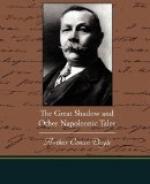For she was so hard to understand, or, at least, she was so for a dull-witted country lad like me. For if I would talk to her of my real prospects, and how by taking in the whole of Corriemuir we might earn a hundred good pounds over the extra rent, and maybe be able to build out the parlour at West Inch, so as to make it fine for her when we married, she would pout her lips and droop her eyes, as though she scarce had patience to listen to me. But if I would let her build up dreams about what I might become, how I might find a paper which proved me to be the true heir of the laird, or how, without joining the army, which she would by no means hear of, I showed myself to be a great warrior until my name was in all folks’ mouths, then she would be as blithe as the May. I would keep up the play as well as I could, but soon some luckless word would show that I was only plain Jock Calder of West Inch, and out would come her lip again in scorn of me. So we moved on, she in the air and I on the ground; and if the rift had not come in one way, it must in another.
It was after Christmas, but the winter had been mild, with just frost enough to make it safe walking over the peat bogs. One fresh morning Edie had been out early, and she came back to breakfast with a fleck of colour on her cheeks.
“Has your friend the doctor’s son come home, Jack?” says she.
“I heard that it was expected.”
“Ah! then it must have been him that I met on the muir.”
“What! you met Jim Horscroft?”
“I am sure it must be he. A splendid-looking man—a hero, with curly black hair, a short, straight nose, and grey eyes. He had shoulders like a statue, and as to height, why, I suppose that your head, Jack, would come up to his scarf-pin.”
“Up to his ear, Edie!” said I indignantly. “That is, if it was Jim. But tell me. Had he a brown wooden pipe stuck in the corner of his mouth?”
“Yes, he was smoking. He was dressed in grey, and he has a grand deep strong voice.”
“Ho, ho! you spoke to him!” said I.
She coloured a little, as if she had said more than she meant.
“I was going where the ground was a little soft, and he warned me of it,” she said.
“Ah! it must have been dear old Jim,” said I. “He should have been a doctor years back, if his brains had been as strong as his arm. Why, heart alive, here is the very man himself!”
I had seen him through the kitchen window, and now I rushed out with my half-eaten bannock in my hand to greet him. He ran forward too, with his great hand out and his eyes shining.
“Ah! Jock,” he cried, “it’s good to see you again. There are no friends like the old ones.”
Then suddenly he stuck in his speech, and stared with his mouth open over my shoulder. I turned, and there was Edie, with such a merry, roguish smile, standing in the door. How proud I felt of her, and of myself too, as I looked at her!




